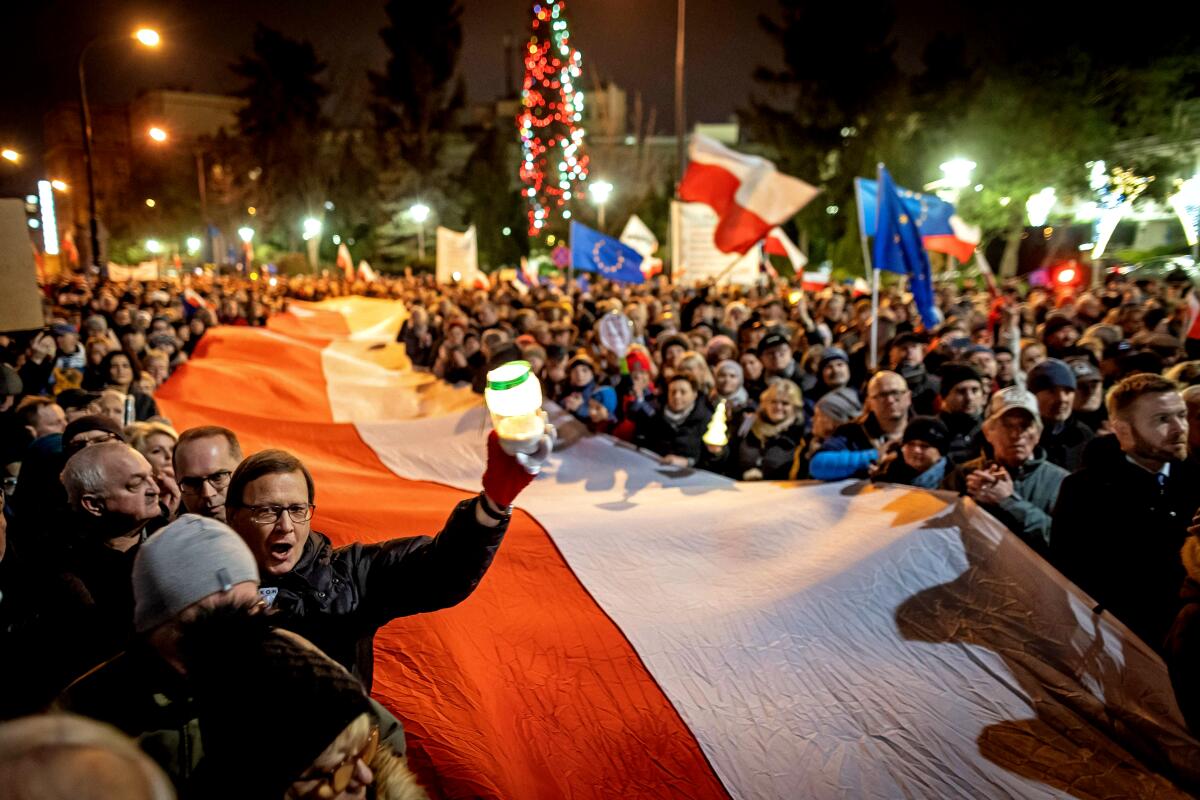Mass protests erupt across Poland over plan to punish judges

- Share via
WARSAW — Protesters gathered in large numbers across Poland on Wednesday evening to denounce legislation being pushed by the populist ruling party that would give the government the power to fire judges.
The protesters voiced fears that the legislation, if passed, would mark an end to the separation of powers, and be the most dangerous blow to the young democracy’s foundations since the right-wing party, Law and Justice, came to power in 2015.
They also warned that it would add to Poland’s marginalization in the European Union and possibly even lead to its eventual departure from the 28-country bloc.
People chanted, “Free courts!” as they gathered in front of the Parliament in Warsaw and at court buildings in cities across the nation of 38 million people, including Katowice, Krakow, Wroclaw, Olsztyn, Bialystok and Poznan. Private broadcaster TVN24 said there were protests in 160 places.
“Today is a difficult day. Once again the fate of free courts hangs in the balance,” Igor Tuleya, a judge who has been a prominent critic of the government, told a crowd in Warsaw.
A prosecutor, Dariusz Korneluk, said regular citizens would also suffer if judges are intimidated to the point they issue government-friendly rulings, fearing retribution if they don’t. “We are here because the foundations of our country’s system are under threat,” he said.
Earlier Wednesday, the Parliament’s Bureau of Research, which analyzes the legality of draft laws, warned that the new legislation violates judicial independence and the primacy of EU law.
Among other items in the draft law, which the lower house will begin debating Thursday, the government would have the power to discipline judges who carry out rulings in line with EU law, including questioning judicial appointments. The Supreme Court said that could put Poland irremediably at odds with the European bloc.
“With this law, the Polish authorities are attempting to remove what little remains of judicial independence in Poland,” Amnesty International said.
Prime Minister Mateusz Morawiecki said the changes are aimed at preventing “chaos” stemming from a recent EU court decision. That November ruling by the European Court of Justice left it up to the Polish courts to determine whether a new disciplinary chamber for judges within the Supreme Court and a separate council that appoints judges are sufficiently independent.
“No serious state can allow some judges to question the ability to make appointments or the sentences and decisions made by other judges,” Morawiecki said Tuesday.
If passed, the laws would give the government the power to fire or fine judges who rule in ways or express positions that it doesn’t like. One new provision would require judges to declare what associations they are affiliated with and all names under which they appear online.
Critics call the draft legislation repressive and fear it would lead to a final blow against any independence left for Poland’s judicial system after four years of overhauls under Law and Justice.
The Supreme Court said those provisions represent a “continuation of the lawlessness of the 1980s,” a time when Poland was ruled by a repressive communist regime.
“Everything is there: a ban on the freedom of speech by judges, the establishment of a surveillance mechanism and a drastic reduction of their right to have profiles on social networks,” the court said.
Law and Justice over the last four years took control of the Constitutional Tribunal, the public prosecution system and a body that appoints judges. However, the EU court blocked key measures that would have given it control of the Supreme Court.
Meanwhile, many Polish judges have continued to assert their independence, issuing judgments that in some cases have gone against the interests of the ruling authorities. For instance, journalists accused by the party of defamation for critical remarks and investigations have won cases. So have several people who have sued the government for the country’s dangerously high smog levels.
Law and Justice has a majority in the lower house of Parliament, meaning the legislation is likely to pass there. The Senate, however, is controlled by the opposition and will seek to block it. But the upper house is much less powerful, and while it can slow down the passage of the laws and suggest changes, it can’t stop them entirely.
More to Read
Sign up for Essential California
The most important California stories and recommendations in your inbox every morning.
You may occasionally receive promotional content from the Los Angeles Times.













